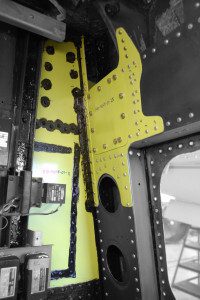First published in Flight Levels Online, Summer 2013 issue

Twin Commander Aircraft has been working with the FAA to provide relief for some operators from the strict compliance requirements in the airworthiness directive based on Twin Commander Service Bulletin (SB) 241.
A modification to SB241 that is in the final stages of approval will allow operators to perform an inspection of the affected area in the aft pressure bulkhead. If the inspection reveals cracking, the operator will need to complete the SB241 modification. If the inspection does not reveal cracking, the operator will be able to resume flight for another 100 flights or 110 flight hours.
This inspection, which requires that the modified thicker-gauge upper window channel (p/n 310704-3/4 or 310704-5/6) first be installed, can be conducted up to three times (provided no cracking is found) before the full SB241 inspection and mod must be performed.
“This will give operators who are facing a busy flying season a reprieve,” says Twin Commander President Matt Isley. “Given the number of aircraft affected by the AD, this will also allow some operators an option to continue flying as they wait for an SB241 inspection slot to open up at a maintenance center,” he says.
The history of SB241 goes back about three years to a routine, scheduled inspection of a Twin Commander 690B, conducted by an authorized Twin Commander Service Center, that revealed cracks in the aft pressure bulkhead area. Subsequent inspections of several other 690A and 690B model Twin Commanders turned up evidence of similar cracking.
Working closely with the FAA, Twin Commander Aircraft developed a service bulletin (SB241) that called for inspections of the affected area on 690A/B aircraft, and modifications in the event cracking is found. Later-model Twin Commanders –– 690C/D and 695/A/B –– have a different wing-to-fuselage design and are not affected by the service bulletin.
On May 14 of this year the FAA issued an airworthiness directive mandating compliance with the aft pressure bulkhead inspection procedure and modifications specified in SB241. Though not an emergency airworthiness directive, the AD nevertheless was issued without prior public comment nor a cost-benefit analysis.
Although issuance of the AD was not unexpected, the compliance schedule is much more aggressive than specified in the service bulletin. The aggressive compliance schedule places an extreme burden on owners of many of the approximately 400 aircraft affected by the AD –– about half the Twin Commander turboprop fleet, according to Isley.
Twin Commander Aircraft is working with its Service Centers to meet the greatly accelerated demand prompted by the airworthiness directive.
“In addition to originally identifying the problem at one of our own Service Centers, our engineering team quickly developed a solution and we have aggressively communicated the matter to aircraft owners over the last three years,” Isley commented.
“To ensure that modifications are performed to the highest of standards, we developed a factory training course specific to SB241. To date, Eagle Creek Aviation Services, which administers the training program, has trained more than 50 technicians to perform the work,” Isley noted.
“Though the FAA’s AD note does not require it, it is extremely important that operators look only to those maintenance facilities that have received the proper factory training to perform this work. The modification work is difficult and complex, and having it done right the first time will save operators time and money in the long run,” Isley said.
“The safety of the fleet is first and foremost our priority and responsibility,” Isley added. “Once properly implemented, this modification will permanently address problems caused by dynamic and cyclic stresses in the aft pressure bulkhead area.
“Commander owners and operators have always enjoyed best-in-class safety, performance, and fuel-efficiency, and we at Twin Commander Aircraft, along with our Service Centers, pledge to continue delivering the best legacy aircraft support in the world.”
